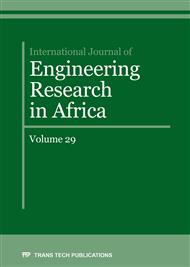[1]
R., M'Hallah, Minimizing total earliness and tardiness on a single machine using a hybrid heuristic Computers & Operations Research. 34(2007) 3126–3142.
DOI: 10.1016/j.cor.2005.11.021
Google Scholar
[2]
I. Al-Harkan, & A. Badiru, Knowledge-Based Approach to machine sequencing. Engineering Design and automation 11 (1995). 43-58.
Google Scholar
[3]
French, S. Sequencing and Scheduling, 1st Edition, Ellis Horwood Limited. (1982).
Google Scholar
[4]
M.T. Tabucanon, and A.A. Cenna, Bicriterion scheduling problem in a job shop with parallel processor International journal of Production Economics, 251(1991) 95-101.
DOI: 10.1016/0925-5273(91)90135-g
Google Scholar
[5]
W. E., Smith, Various Optimizers for Single-Stage Production. Naval Research Logistic Quarter, 31(1956)59-66.
Google Scholar
[6]
K.R. Baker, & J.W. Bertrand, A Dynamic Priority Rule for Scheduling against Due-dates. Journal of Operational Management, 31 (1982) 37-42.
DOI: 10.1016/0272-6963(82)90020-1
Google Scholar
[7]
L. N. Van Wassenhove, & F. Gelders, Solving a Bicriterion scheduling problem. European Journal of Operational Research, 41(1980) 42-48.
DOI: 10.1016/0377-2217(80)90038-7
Google Scholar
[8]
Erenay, F.S., Sabuncuoglu, I., Toptal, A. & Tiwari, M.K. New solution methods for single machine bi-criteria Scheduling problem: Minimization of average flow time and number of tardy. European Journal of Operation Research, 201(2010) 89 – 98.
DOI: 10.1016/j.ejor.2009.02.014
Google Scholar
[9]
E.O. Oyetunji, & A.E. Oluleye, Heuristics for minimizing the total completion time and the number of tardy jobs simultaneously on single machine with release time. Research Journal of Applied Sciences, 32 (2008. ) 147–152.
DOI: 10.7166/21-2-53
Google Scholar
[10]
J. Du, & Y.T. Leung, Minimizing total tardiness on one machine is NP-hard. Mathematics of Operations Research, 153(1990) 483–495.
DOI: 10.1287/moor.15.3.483
Google Scholar
[11]
V.O., Oladokun, O. E, Owaba & F.O. Olaosebikan, A Bi-Criteria algorithm for the simultaneous minimization of makespan and number of tardy jobs on a single machine with sequence dependent set-up time. Research Journal of Applied Science, Engineering and Technology, 39(2011).
Google Scholar
[12]
S.A. Akande, Oluleye, A.E. & E.O. Oyetunji, Reducibility of Some Multi Criteria Scheduling Problems to Bicriteria Scheduling Problems. Proceedings of the 2014 International Conference on Industrial Engineering and Operations Management Indonesia, (2014).
DOI: 10.1109/ieom.2015.7228107
Google Scholar
[13]
S.A. Akande, A . E Oluleye, & E. O Oyetunji, On the Reducibility of Some Multi Criteria Scheduling Problems to Bicriteria Scheduling Problems. Proceedings of the 2015 International Conference on Industrial Engineering and Operations Management Hyatt Dubai, (2015).
DOI: 10.1109/ieom.2015.7228107
Google Scholar
[14]
T. Sen, & O. Dillepan, Bicriterion scheduling problems involving total tardiness and total flow time Journal of information and optimization science, 202(1999) 155-170.
DOI: 10.1080/02522667.1999.10699409
Google Scholar
[15]
E.O. Oyetunji, & A.E. Oluleye, A Generalized algorithm for solving multicriteria scheduling problems. Advanced Materials Research, 367 (2012) 653-666.
DOI: 10.4028/www.scientific.net/amr.367.653
Google Scholar
[16]
E.O., Oyetunji, Some common performance measures in scheduling problems. Research Journal of Applied Science, Engineering & Technology. 12(2009. ) 6-9.
Google Scholar
[17]
E.O. Oyetunji, & A.E. Oluleye, Hierarchical Minimization of Total Completion Time and Number of Tardy Jobs Criteria. Asian Journal of Information Technology, 74(2010) 157-161.
Google Scholar
[18]
E.O. Oyetunji, Assessing solution methods to mixed multi-objectives scheduling problems. International Journal of Industrial and Systems Engineering, 92(2011) 213-226.
DOI: 10.1504/ijise.2011.042836
Google Scholar
[19]
J.K., Cochran, H Shwu,. & J.W. Fowler, A multi-population genetic algorithm to solve multi-objective scheduling problems for parallel machines. Computers and Operations Research, 307 (2003)1087– 1102.
DOI: 10.1016/s0305-0548(02)00059-x
Google Scholar
[20]
E.O. Oyetunji, & A.E. Oluleye, Evaluating solution methods to bicriteria scheduling problems Advanced Materials Research, 62(2009. ) 577–584.
DOI: 10.4028/www.scientific.net/amr.62-64.577
Google Scholar
[21]
E. O. Oyetunji, A. E. Oluleye, & S.A. Akande, Approximation Algorithms for Minimizing Sum of Flow Time on a Single Machine with Release Dates. International Journal of Modern Engineering Research 23(2012) 687-696.
Google Scholar
[22]
J.C. Bean& D.H. Hall, Accuracy of the modified due date rule, Department of Industrial and Production Engineering, Michigan University, Technical report. (1985) 85-100.
Google Scholar
[23]
J.T. Naidu, A Note on a Well-Known Dispatching Rule to Minimise Total Tardiness. International Journal of Management Science. 312(2003) 137–140.
DOI: 10.1016/s0305-0483(03)00020-3
Google Scholar
[24]
K.R. Baker & D, Trietsch, Principles of sequencing and scheduling. John Wiley & Sons. Ist ed (2013).
Google Scholar
[25]
M.L. Pinedo. Scheduling – Theory, Algorithms and Systems New York : Springer. (2008).
Google Scholar
[26]
A. Gürsel, S. X. Yang, O. I. Alhawari, J. Santos, & R. Vazquez, A genetic algorithm approach for minimizing total tardiness in single machine scheduling. International Journal of Industrial Engineering and Management, 33(2012. ), 163-171.
Google Scholar
[27]
D. H Brian and T. V. Daniel. Essential MATLAB for Engineers and Scientists. 3rd ed. Amsterdam : Butterworth-Heinemann. (2007).
Google Scholar
[28]
A.O. Festus. Statistical Method. An introduction. International Publisher Ltd. Ist ed (2006).
Google Scholar


